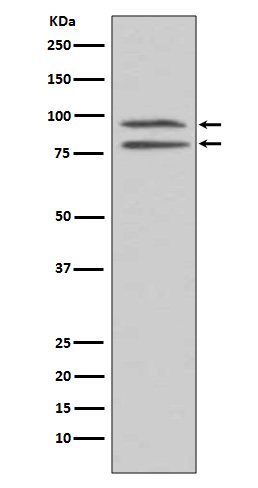P-MSK1 (S376) Rabbit mAb [TWHf]Cat NO.: A97656
Western blot(SDS PAGE) analysis of extracts from HEK293 cell lysate treated with EGF.Using P-MSK1 (S376) Rabbit mAb [TWHf]at dilution of 1:1000 incubated at 4℃ over night.
Product information
Protein names :90 kDa ribosomal protein S6 kinase polypeptide 5; EC 2.7.11.1; KS6A5; MSPK1; Nuclear mitogen- and stress-activated protein kinase-1; RLPK; RPS6KA5; kinase MSK1; ribosomal protein S6 kinase;
UniProtID :O75582
MASS(da) :89,865
MW(kDa) :90kDa
Form :Liquid
Purification :Affinity-chromatography
Host :Rabbit
Isotype : IgG
sensitivity :Endogenous
Reactivity :Human Rat
- ApplicationDilution
- 免疫印迹(WB)1:1000-2000
- 免疫组化(IHC)1:100
- 免疫荧光(ICC/IF)1:100
- The optimal dilutions should be determined by the end user
Specificity :Antibody is produced by immunizing animals with A synthesized peptide derived from human Phospho-MSK1 (S376)
Storage :Antibody store in 10 mM PBS, 0.5mg/ml BSA, 50% glycerol. Shipped at 4°C. Store at-20°C or -80°C. Products are valid for one natural year of receipt.Avoid repeated freeze / thaw cycles.
WB Positive detected :HEK293 cell lysate treated with EGF.
Function : Serine/threonine-protein kinase that is required for the mitogen or stress-induced phosphorylation of the transcription factors CREB1 and ATF1 and for the regulation of the transcription factors RELA, STAT3 and ETV1/ER81, and that contributes to gene activation by histone phosphorylation and functions in the regulation of inflammatory genes (PubMed:11909979, PubMed:12569367, PubMed:12763138, PubMed:9687510, PubMed:18511904, PubMed:9873047). Phosphorylates CREB1 and ATF1 in response to mitogenic or stress stimuli such as UV-C irradiation, epidermal growth factor (EGF) and anisomycin (PubMed:11909979, PubMed:9873047). Plays an essential role in the control of RELA transcriptional activity in response to TNF and upon glucocorticoid, associates in the cytoplasm with the glucocorticoid receptor NR3C1 and contributes to RELA inhibition and repression of inflammatory gene expression (PubMed:12628924, PubMed:18511904). In skeletal myoblasts is required for phosphorylation of RELA at 'Ser-276' during oxidative stress (PubMed:12628924). In erythropoietin-stimulated cells, is necessary for the 'Ser-727' phosphorylation of STAT3 and regulation of its transcriptional potential (PubMed:12763138). Phosphorylates ETV1/ER81 at 'Ser-191' and 'Ser-216', and thereby regulates its ability to stimulate transcription, which may be important during development and breast tumor formation (PubMed:12569367). Directly represses transcription via phosphorylation of 'Ser-1' of histone H2A (PubMed:15010469). Phosphorylates 'Ser-10' of histone H3 in response to mitogenics, stress stimuli and EGF, which results in the transcriptional activation of several immediate early genes, including proto-oncogenes c-fos/FOS and c-jun/JUN (PubMed:12773393). May also phosphorylate 'Ser-28' of histone H3 (PubMed:12773393). Mediates the mitogen- and stress-induced phosphorylation of high mobility group protein 1 (HMGN1/HMG14) (PubMed:12773393). In lipopolysaccharide-stimulated primary macrophages, acts downstream of the Toll-like receptor TLR4 to limit the production of pro-inflammatory cytokines (By similarity). Functions probably by inducing transcription of the MAP kinase phosphatase DUSP1 and the anti-inflammatory cytokine interleukin 10 (IL10), via CREB1 and ATF1 transcription factors (By similarity). Plays a role in neuronal cell death by mediating the downstream effects of excitotoxic injury (By similarity). Phosphorylates TRIM7 at 'Ser-107' in response to growth factor signaling via the MEK/ERK pathway, thereby stimulating its ubiquitin ligase activity (PubMed:25851810)..
Tissue specificity :Widely expressed with high levels in heart, brain and placenta. Less abundant in lung, kidney and liver..
Subcellular locationi :Nucleus. Cytoplasm.
IMPORTANT: For western blots, incubate membrane with diluted primary antibody in 1% w/v BSA, 1X TBST at 4°C overnight.


